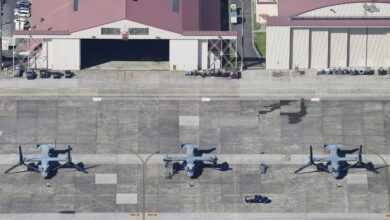
As Iran and its proxies become more emboldened in their ambitions, the United States should strongly consider better assisting its allies in confronting Tehran and defending mutual security interests.
In a 2019 report, the Jewish Institute for National Security of America called for “frontloading,” or shifting forward, annual US defense assistance to Israel without raising the yearly cost for Washington.
Currently, this military aid — the vast majority of which Israel must spend in the United States — is evenly dispersed throughout a 10-year Memorandum of Understanding (MOU), agreed in 2016, and subject to annual congressional approval.
Frontloading would enable US defense assistance to parallel outlays to American commercial defense firms more accurately while accelerating Israeli procurement of much-needed US weapons, such as the F-35 and the KC-46.
Current System’s Drawbacks
When tied to the US defense sector, the distribution of foreign aid presents a policy conundrum — a balancing act between Congress maintaining its constitutionally mandated control of funds while ensuring a vibrant and healthy US industrial base.
Israel has benefited from the defense planning certainty afforded by the MOU’s evenly divided allocation of $3.3 billion per annum for critical Israeli defense modernization and $500 million yearly for joint missile defense cooperative activities.
However, the myriad threats Israel faces have increased since 2016, resulting in the need to fast-track vital aircraft and munitions to offset these heightened security dangers.
More rockets are being fired at southern Israel from Gaza.
An important reminder:
4,340+ rockets have been fired at Israel since last Monday by terrorists in Gaza.— Israel Defense Forces (@IDF) May 20, 2021
Under the current system, defense contracts are subjected to spending caps to meet the limitations of yearly aid payments. The possibility of less aid the following year furthers hesitation to establish long-term commitments such as plant equipment and skilled labor investments. The result is creating short-term contracts where the risk of substantial cost overruns and delayed delivery of systems to the Israel Defense Forces is sizable.
This dilemma is similar to the struggle experienced by government agencies forced to rely upon continuing resolutions to invest in long-term, advanced contracts such as the Department of Defense (DOD).
Some have pointed out how this arrangement inhibits innovation and overall preparedness of the US defense industrial base and America’s military.
Benefits of Frontloading to US Industry
Congressional legislation has partially rectified both situations, enabling the DOD to sign multiyear contracts for up to five years when spending Foreign Military Financing (FMF) assistance, permitting Israel to utilize “cash-flow financing.” These contracts create a procurement mechanism to maintain payment flexibility with American defense firms.
As is the case with the DOD, Israeli procurements may demand significant capital investments to acquire long-lead materials and sub-systems. Under those circumstances, US defense contractors would need larger payments upfront. Such payments could only be assured if aid were frontloaded through larger FMF appropriations or promises from the federal bureaucracy that the costs of outside loans would be covered.

Furthermore, there’s a strong “economies of scale” argument to be made. The larger the purchase, the more efficient the industrial base becomes as the cost per unit decreases. However, economies of scale may only be triggered by a sufficiently large expenditure, which only frontloading would facilitate.
Finally, frontloading aid to Israel would help shield valuable contracts within the US defense sector from political volatility in Congress, which has only increased in recent years. Indeed, it would strike a thoughtful balance between congressional approval and the overall health of our industrial base — and indirectly, US interests abroad.
A Win-Win Proposition
Other allied recipients of security support will benefit from this restructuring, as well. Washington should begin by examining its defense assistance to one of its closest allies, whose military expenditure strengthens the US manufacturing and high-tech sectors and supports American jobs in nearly all 50 states.
There’s a way to make such aid more effective for both Israel and the US defense industrial base and to dramatically increase efficiency. To achieve this, America must begin with restructuring how it distributes such aid to its closest allies.

 Lieutenant General Raymond V. Mason, USA (ret.) is the former Deputy Chief of Staff for Logistics, G4 Army Staff and was a participant on the Jewish Institute for National Security of America’s (JINSA) 2019 Generals and Admirals trip to Israel.
Lieutenant General Raymond V. Mason, USA (ret.) is the former Deputy Chief of Staff for Logistics, G4 Army Staff and was a participant on the Jewish Institute for National Security of America’s (JINSA) 2019 Generals and Admirals trip to Israel.
Erielle Davidson is a JINSA Senior Policy Analyst.
The views and opinions expressed here are those of the author and do not necessarily reflect the editorial position of The Defense Post.
The Defense Post aims to publish a wide range of high-quality opinion and analysis from a diverse array of people – do you want to send us yours? Click here to submit an op-ed.











